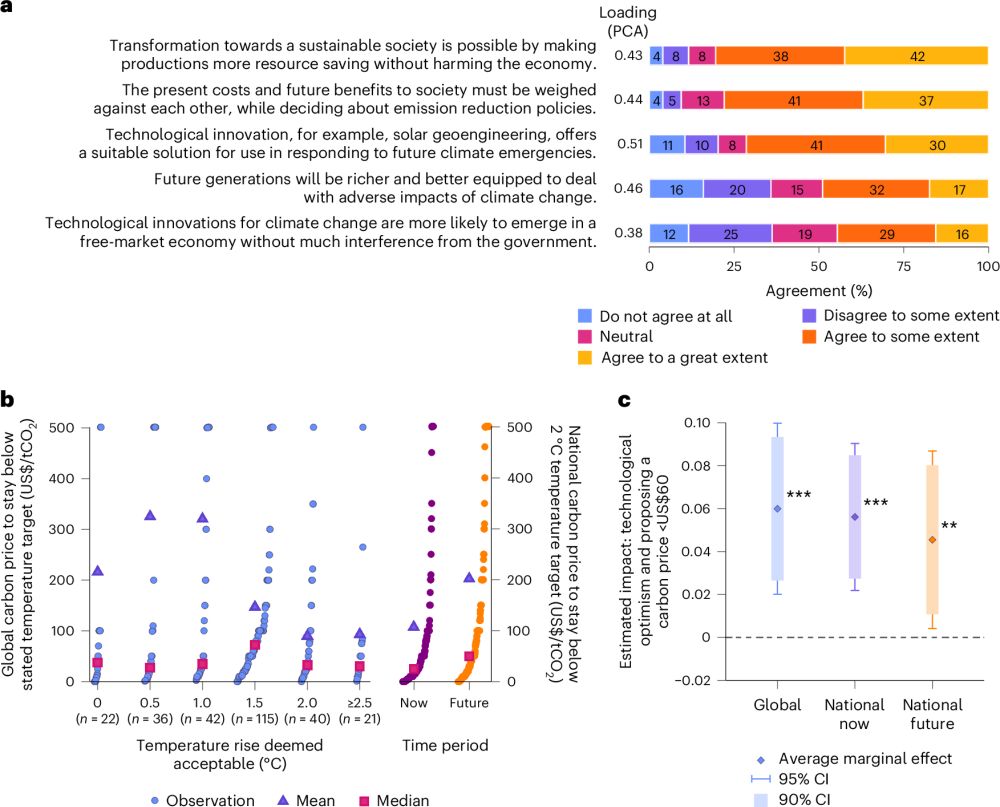
Björn Vollan
@bjoernvollan.bsky.social
Professor of economics and head of the research group "Sustainable Use of Natural Resources". Researching adaptation to climate change, resource governance and aspects of human behavior related to sustainable development. bjoernvollan.wordpress.com
War USAID nicht hauptsächlich für Gesundheitsthemen zuständig? Gerade in dem Bereich wo es positiven Impact gibt (Malaria, HIV, etc.)...? Scheint daher mehr ein Angriff auf den politischen Gegner zu sein als evidenzbasiertes handeln
February 16, 2025 at 9:23 AM
War USAID nicht hauptsächlich für Gesundheitsthemen zuständig? Gerade in dem Bereich wo es positiven Impact gibt (Malaria, HIV, etc.)...? Scheint daher mehr ein Angriff auf den politischen Gegner zu sein als evidenzbasiertes handeln
We suggest that frameworks like participatory decision-making, citizens’ assemblies, or community dialogues are better suited to integrate relational values. These methods make space for nuanced trade-offs between cultural ties and practical needs. www.tandfonline.com/doi/full/10....

Pitfalls of monetizing relational values in the context of climate change adaptation
Relational values emphasize the desirable characteristics of nature–society relationships. Unlike instrumental values, relational values have not yet been subjected to monetary quantification, alth...
www.tandfonline.com
November 28, 2024 at 8:18 AM
We suggest that frameworks like participatory decision-making, citizens’ assemblies, or community dialogues are better suited to integrate relational values. These methods make space for nuanced trade-offs between cultural ties and practical needs. www.tandfonline.com/doi/full/10....
Relational values are hard—maybe impossible—to monetize. But that doesn’t mean they should be overlooked. Nor should they dominate adaptation planning entirely, as this could risk sidelining practical and instrumental considerations.
November 28, 2024 at 8:18 AM
Relational values are hard—maybe impossible—to monetize. But that doesn’t mean they should be overlooked. Nor should they dominate adaptation planning entirely, as this could risk sidelining practical and instrumental considerations.
The Results:
1️⃣ WTP alone doesn’t capture the depth of relational values. People value cultural connections but struggle to express this in monetary terms.
2️⃣ Budget preferences reflected relational concerns more effectively, especially in Bangladesh
1️⃣ WTP alone doesn’t capture the depth of relational values. People value cultural connections but struggle to express this in monetary terms.
2️⃣ Budget preferences reflected relational concerns more effectively, especially in Bangladesh

November 28, 2024 at 8:18 AM
The Results:
1️⃣ WTP alone doesn’t capture the depth of relational values. People value cultural connections but struggle to express this in monetary terms.
2️⃣ Budget preferences reflected relational concerns more effectively, especially in Bangladesh
1️⃣ WTP alone doesn’t capture the depth of relational values. People value cultural connections but struggle to express this in monetary terms.
2️⃣ Budget preferences reflected relational concerns more effectively, especially in Bangladesh
We examined whether relational values in the Solomon Islands and Bangladesh could be quantified using monetary tools like:
- Willingness to Pay (WTP)
- Preferences for government budget allocation
👉 Can relational values be monetized?
👉 If so, do these metrics capture their full significance?
- Willingness to Pay (WTP)
- Preferences for government budget allocation
👉 Can relational values be monetized?
👉 If so, do these metrics capture their full significance?
November 28, 2024 at 8:18 AM
We examined whether relational values in the Solomon Islands and Bangladesh could be quantified using monetary tools like:
- Willingness to Pay (WTP)
- Preferences for government budget allocation
👉 Can relational values be monetized?
👉 If so, do these metrics capture their full significance?
- Willingness to Pay (WTP)
- Preferences for government budget allocation
👉 Can relational values be monetized?
👉 If so, do these metrics capture their full significance?
Climate adaptation often relies on cost-benefit analyses to decide:
- Which projects to fund
- Where to invest resources
- Who gets protected
But what about the cultural, emotional, and ethical connections between people and nature—like seeing an atoll as part of your identity?
- Which projects to fund
- Where to invest resources
- Who gets protected
But what about the cultural, emotional, and ethical connections between people and nature—like seeing an atoll as part of your identity?
November 28, 2024 at 8:18 AM
Climate adaptation often relies on cost-benefit analyses to decide:
- Which projects to fund
- Where to invest resources
- Who gets protected
But what about the cultural, emotional, and ethical connections between people and nature—like seeing an atoll as part of your identity?
- Which projects to fund
- Where to invest resources
- Who gets protected
But what about the cultural, emotional, and ethical connections between people and nature—like seeing an atoll as part of your identity?
Local leaders with high solidarity are also trusted more by villagers, especially during crises. Those with high solidarity were named as key helpers after Typhoon Haiyan, reinforcing the importance of pro-social leadership during disasters.
November 12, 2024 at 9:17 AM
Local leaders with high solidarity are also trusted more by villagers, especially during crises. Those with high solidarity were named as key helpers after Typhoon Haiyan, reinforcing the importance of pro-social leadership during disasters.
We controlled for factors like income to isolate the unique election effect—showing that pro-sociality persists regardless of these influences. While councilors earn a small income, the collective work they engage in and their network positions enhance community solidarity.
November 12, 2024 at 9:17 AM
We controlled for factors like income to isolate the unique election effect—showing that pro-sociality persists regardless of these influences. While councilors earn a small income, the collective work they engage in and their network positions enhance community solidarity.
Results show that leaders make more pro-social decisions 2 and 6 years after election. Our study suggests that leaders might internalize villagers’ expectations. A follow-up experiment found that villagers expect elected leaders to be more generous.
November 12, 2024 at 9:17 AM
Results show that leaders make more pro-social decisions 2 and 6 years after election. Our study suggests that leaders might internalize villagers’ expectations. A follow-up experiment found that villagers expect elected leaders to be more generous.
Democratic societies need leaders with strong intrinsic motivations to serve the public. Using a regression discontinuity design, we studied close elections to determine if being elected impacts leaders' pro-social choices.
November 12, 2024 at 9:17 AM
Democratic societies need leaders with strong intrinsic motivations to serve the public. Using a regression discontinuity design, we studied close elections to determine if being elected impacts leaders' pro-social choices.
While most delegates agree that a temperature rise above 1.5°C is unacceptable, techno-optimists were more willing to accept increases beyond 2°C. This disconnect between belief in tech and necessary emissions reductions poses risks for effective climate action.
September 21, 2024 at 8:25 AM
While most delegates agree that a temperature rise above 1.5°C is unacceptable, techno-optimists were more willing to accept increases beyond 2°C. This disconnect between belief in tech and necessary emissions reductions poses risks for effective climate action.
Paradoxically, those who believe most strongly in the power of tech innovation recommend lower carbon prices. But innovation should thrive under higher CO₂ prices, which incentivize technological breakthroughs. Without this push, innovation may not deliver fast enough.
September 21, 2024 at 8:25 AM
Paradoxically, those who believe most strongly in the power of tech innovation recommend lower carbon prices. But innovation should thrive under higher CO₂ prices, which incentivize technological breakthroughs. Without this push, innovation may not deliver fast enough.
Delegates with higher techno-optimism were more likely to recommend books advocating for incremental changes over transformative solutions, such as Andrew McAfee's More from Less vs. Doughnut Economics by @kateraworth.bsky.social
September 21, 2024 at 8:25 AM
Delegates with higher techno-optimism were more likely to recommend books advocating for incremental changes over transformative solutions, such as Andrew McAfee's More from Less vs. Doughnut Economics by @kateraworth.bsky.social
How was this mindset measured? Delegates were surveyed on their agreement with five statements about technological innovation (e.g., “Tech innovations like geoengineering offer suitable solutions to climate emergencies”). Responses formed the basis of their techno-optimism score.
September 21, 2024 at 8:24 AM
How was this mindset measured? Delegates were surveyed on their agreement with five statements about technological innovation (e.g., “Tech innovations like geoengineering offer suitable solutions to climate emergencies”). Responses formed the basis of their techno-optimism score.
Paper rdcu.be/dTKUW
Techno-optimism, the belief that future innovations will mitigate climate change without major systemic changes, is prevalent among many climate delegates. The mindset can lead to delayed action / low recommended CO2 prices
Techno-optimism, the belief that future innovations will mitigate climate change without major systemic changes, is prevalent among many climate delegates. The mindset can lead to delayed action / low recommended CO2 prices

Technology-minded climate delegates support less stringent climate policies
Nature Sustainability - Within high-level conferences devoted to climate or sustainability action, differences in views can lead to differences in policy. This study surveyed how delegates at COP24...
rdcu.be
September 21, 2024 at 8:24 AM
Paper rdcu.be/dTKUW
Techno-optimism, the belief that future innovations will mitigate climate change without major systemic changes, is prevalent among many climate delegates. The mindset can lead to delayed action / low recommended CO2 prices
Techno-optimism, the belief that future innovations will mitigate climate change without major systemic changes, is prevalent among many climate delegates. The mindset can lead to delayed action / low recommended CO2 prices

